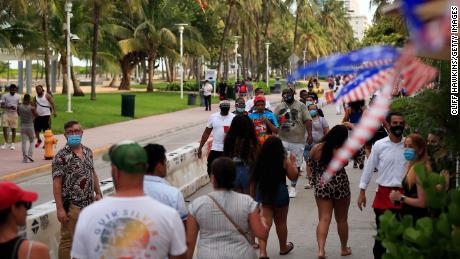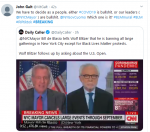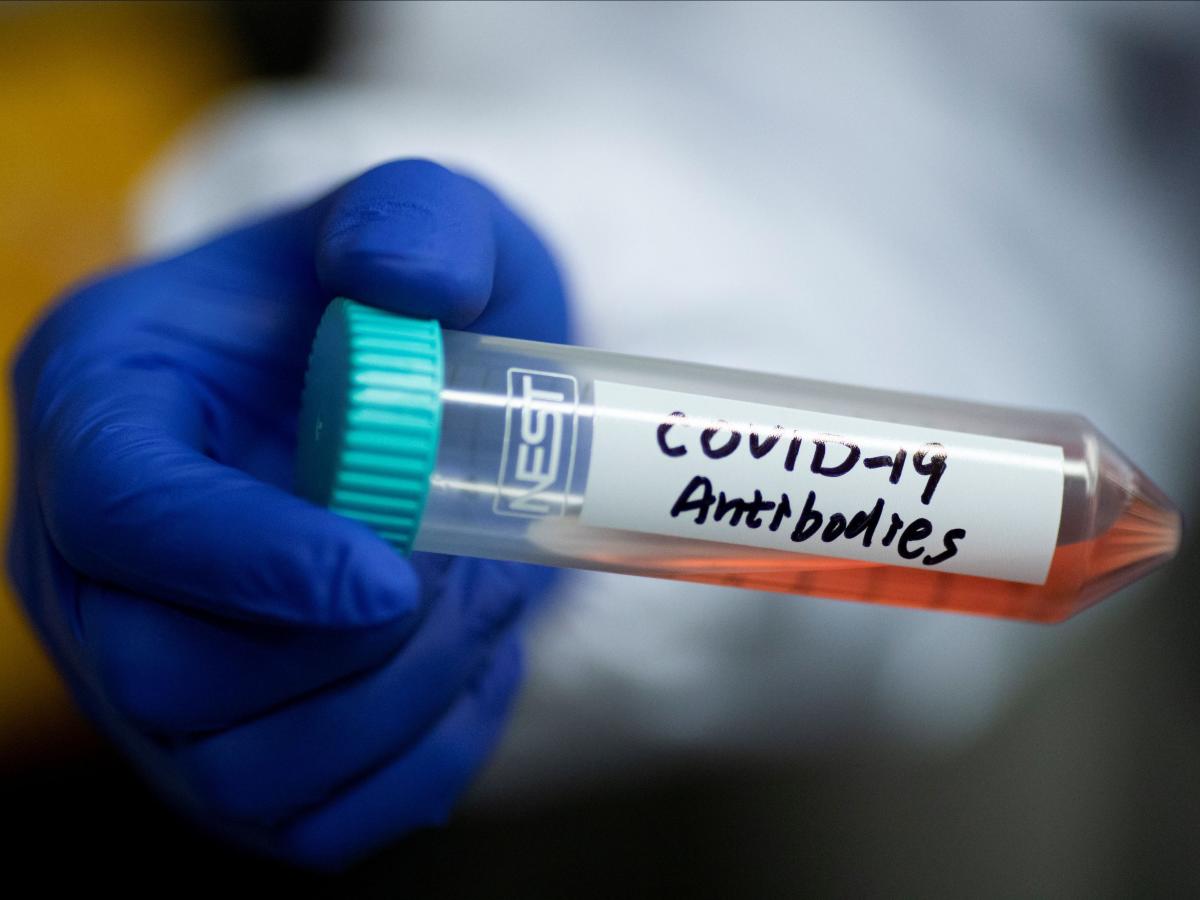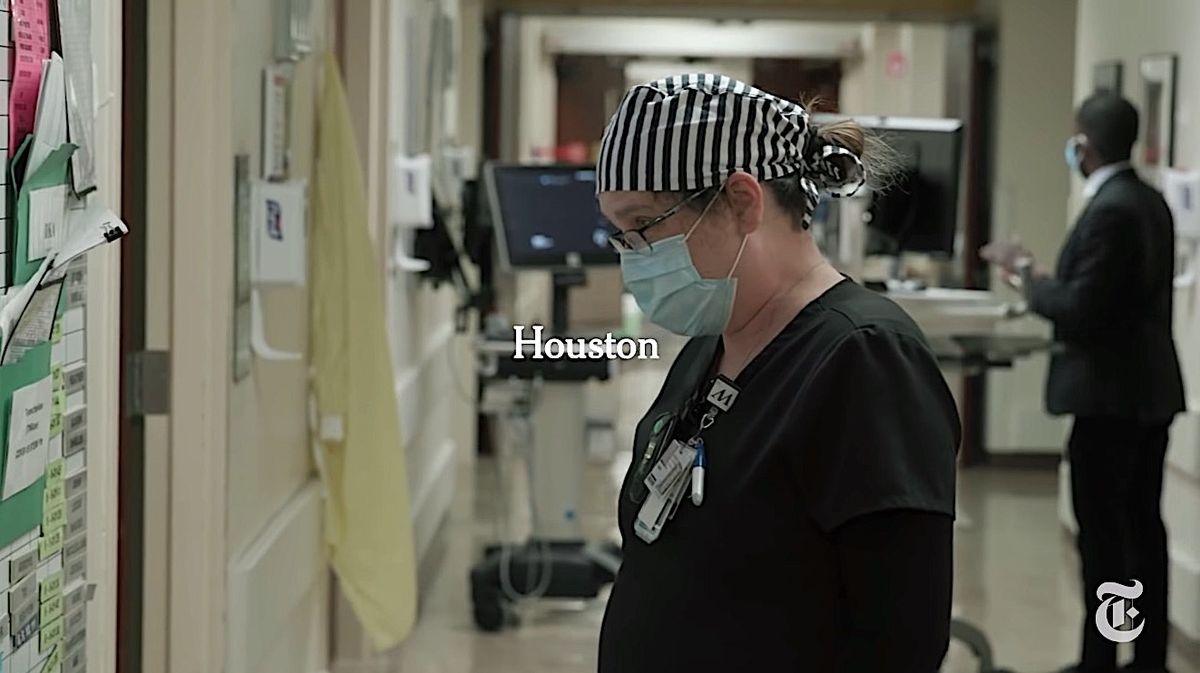(fair use applies)
CDC feels pressure from Trump as rift grows over coronavirus response
Lena H. Sun, Josh Dawsey (Washington Post)
4 hrs ago
The June 28 email to the director of the Centers for Disease Control and Prevention was ominous: A senior adviser to a top Health and Human Services Department official accused the CDC of “undermining the President” by putting out a report about the potential risks of the coronavirus to pregnant women.
The adviser, Paul Alexander, criticized the agency’s methods and said its warning to pregnant women “reads in a way to frighten women .?.?. as if the President and his administration can’t fix this and it is getting worse.”
As the country enters a frightening phase of the pandemic with new daily cases surpassing 57,000 on Thursday, the CDC, the nation’s top public health agency, is coming under intense pressure from President Trump and his allies, who are downplaying the dangers in a bid to revive the economy ahead of the Nov. 3 presidential election. In a White House guided by the president’s instincts, rather than by evidence-based policy, the CDC finds itself forced constantly to backtrack or sidelined from pivotal decisions.
The latest clash between the White House and its top public health advisers erupted Wednesday, when the president slammed the agency’s recommendation that schools planning to reopen should keep students’ desks six feet apart, among other steps to reduce infection risks. In a tweet, Trump — who has demanded schools at all levels hold in-person classes this fall — called the advice “very tough & expensive.”
“While they want them open, they are asking schools to do very impractical things. I will be meeting with them!!!” Trump tweeted Wednesday. The CDC was already planning to issue new guidelines in the coming days. But Vice President Pence on Wednesday explicitly tied the effort to Trump’s ire.
“The president said today we just don’t want the guidance to be too tough,” Pence told reporters. “And that’s the reason next week the CDC is going to be issuing a new set of tools.”
Analysts say the deepening divide is undermining the authority of one of the world’s premier public health agencies, which previously led fights against malaria, smallpox and HIV/AIDS. Amid the worst public health crisis in a century, the CDC has in recent months altered or rescinded recommendations on topics including wearing masks and safely reopening restaurants and houses of worship as a result of conflicts with top administration officials.
“At a time when our country needs an orchestrated, all-hands-on-deck response, there is simply no hand on the tiller,” said Beth Cameron, former senior director for global health security and biodefense on the White House National Security Council.
In the absence of strong federal leadership, state and local officials have been left to figure things out for themselves, leading to conflicting messaging and chaotic responses. Trump’s decision to pull the United States out of the World Health Organization further undermined efforts to influence global strategies against the coronavirus, including how vaccines will be distributed.
The CDC, meanwhile, is increasingly isolated — a function both of its growing differences with the White House and of its own significant missteps earlier in the outbreak.
Those stumbles include the botched rollout of test kits likely contaminated at a CDC lab in late January, which led to critical delays in states’ ability to know where the virus was circulating. And the CDC’s initial decision to test only a narrow set of people gave the virus a head start spreading undetected across the country.
During a May lunch with Senate Republicans, Trump told the group the CDC “blew it” on the coronavirus test and that he’d installed a team of “geniuses” led by his son-in-law Jared Kushner to handle much of the response, according to two people familiar with the lunch who spoke on the condition of anonymity.
“There is a view the CDC is staffed with ‘deep state’ Democrats that are trying to tweak the administration,” said one adviser who also spoke on the condition of anonymity to reveal private conversations.
White House officials, who see the president’s reelection prospects tied to economic recovery, also say they’ve been deeply frustrated by what they view as career staffers at the agency determined “to keep things closed,” according to a senior administration official who spoke on the condition of anonymity to reveal internal deliberations.
Trump believes the CDC is “ineffective” and a “waste of time” but doesn’t blame CDC Director Robert Redfield and generally likes him, said another official speaking on the condition of anonymity. “He just thinks he is a poor communicator,” the official added.
Joe Grogan, former head of the White House Domestic Policy Council, said Redfield had fans inside the White House who work on “addiction issues, on life issues, on HIV issues,” among other topics.
But he said Redfield has few political appointees to help him run a complex agency. “How do you run a place like that with .?.?. [few] appointees?” Grogan asked.
HHS Secretary Alex Azar called the director “a key scientific guide for the President and his administration, a trusted source for the American people, and a closely engaged partner of state and local governments.”
But Redfield is not a voice in coronavirus task force meetings, and “is never really in the Oval [Office] with the president,” said another senior administration official, who also spoke on the condition of anonymity to discuss the internal dynamics.
Even Redfield’s supporters say he has failed to be an effective advocate for the agency.
“Bob Redfield’s commitment to public health is completely strong,” said William Schaffner, a veteran infectious-disease specialist at Vanderbilt University. But he said Redfield lacks the standing, deftness and communication capacity to persuade skeptical audiences, including those in the White House, that protecting public health and fostering economic recovery are not opposing goals.
Redfield, for his part, downplayed Trump’s criticism of the CDC school reopening guidelines after a coronavirus task force briefing Wednesday, saying the agency and the president were “totally aligned.”
“We’re both trying to open the schools,” he said.
White House spokesman Judd Deere also disputed big differences, saying in a statement that the White House and the CDC “have been working together in partnership since the very beginning of this pandemic to carry out the President’s highest priority: the health and safety of the American public.
“The CDC is the nation’s trusted health protection agency and its infectious-disease and public health experts have helped deliver critical solutions to save lives. We encourage all Americans to continue to follow the CDC’s guidelines and use best-practices they have learned, such as social distancing, face coverings, and good hygiene, to maintain public health and continue our Transition to Greatness.”
But some health experts were indignant the agency had been ordered to rewrite guidance to reopen schools to “make it easier and cost less” — a demand that effectively “turns science on its head,” said Tom Inglesby, director of Johns Hopkins University’s Center for Health Security.
“CDC should be giving their best judgments on how to lower risks to make schools safer,” he said. “That’s their job. If they aren’t allowed to do that, the public will lose confidence in the guidance.”
The diminished role of the 74-year-old agency has bewildered infectious-disease experts, as well as members of the public seeking guidance.
After six states set one-day case records on July 3, Carlos del Rio, executive associate dean at Emory University’s School of Medicine, tweeted at Tom Frieden, a former CDC director, “Tom, where is @CDCgov ? Why are they not out there shouting ‘fire’?”
Frieden shot back: “They are still there, still doing great work, just not being allowed to talk about it, not being allowed to guide policy, not being allowed to develop, standardize, and post information that would give, by state and county, the status of the epidemic and of our control measures.”
Jeffrey Duchin, the health officer at Seattle and King County health department, added: “Agree. Muzzled, neutered and exiled.”
The agency has been largely invisible. After more than three months of silence, it resumed briefings for the public last month. There have been two.
By comparison, when the H1N1 swine flu pandemic hit the United States in the spring of 2009, the CDC held briefings almost every day for six consecutive weeks.
During this outbreak, the agency’s regular briefings ended abruptly after White House officials were angered when a top CDC leader warned that Americans could face “significant disruption” to their lives as a result of the virus’s spread to the United States.
CDC officials say they are still getting their message out, pointing to more than 2,000 documents providing pandemic-related information about reopening and staying safe for dozens of groups and venues, including funeral home directors, amusement parks and pet owners. Each Friday, the CDC also posts CovidView, a weekly report of selected data and trends on testing, hospitalizations and reported deaths.
But the information is posted without additional explanation or analysis.
“I want to hear a real person give me three minutes based on these findings,” said del Rio, also a global health and infectious-disease professor at Emory. “I want to see them in the news, being interviewed, giving us the data.”
Scientists at the CDC and former colleagues speak of deep frustration and low morale over its inability to fully share and explain scientific and medical information.
Researchers are fearful for their jobs and want to protect the integrity of the data they release. “If you want to say something, you’re thinking, ‘what’s the White House going to say and how are they going to use it,’ ” said one longtime scientist who spoke on the condition of anonymity for fear of retaliation.
The lack of briefings has fostered misunderstandings at times. In early April, for instance, when the agency reversed its position and recommended the use of cloth face coverings, CDC scientists gave no public briefings explaining why they made the change.
“It’s not rocket science,” said Nancy Cox, a virologist and former CDC official who led the influenza program for 22 years and was part of the agency’s response during the 2009 H1N1 swine flu pandemic. “But the reasoning behind those changes should be explained as clearly as possible and then you can get everyone on board.”
In the CDC’s absence, academic medical centers, public health and professional disease groups have filled the void by holding coronavirus briefings and providing analysis of key issues, data and research studies. Frieden, the president of Resolve to Save Lives, a New York nonprofit, has also been posting long Twitter threads analyzing the weekly CDC data released on Fridays.
Alarmed at the agency’s diminished role, nearly 350 public health organizations sent a letter Tuesday to Azar urging him to advocate for the CDC. The agency must be allowed to speak based on the best available science “and with an unfettered voice,” said John Auerbach, president and chief executive of Trust for America’s Health, a public health nonprofit that led the effort.
House Democrats echoed those concerns in a separate letter to Azar last month. Reps. Diana DeGette of Colorado and Frank Pallone Jr. of New Jersey, who chairs the House Energy and Commerce Committee, said they were troubled by reports that administration officials are considering narrowing the CDC’s mission and embedding more political appointees at the Atlanta-based agency.
Traditionally the CDC has one political appointee, the director. Now it has Redfield and five other political appointees, including two advisers added in recent weeks.
“Now more than ever, the American people need a robust and effective CDC that is not repeatedly undermined by others in the administration, including the President and the Vice President,” the letter said.
White House Chief of Staff Mark Meadows views the agency as a problem and has criticized the CDC repeatedly to other administration officials, said a senior administration official.
White House and HHS officials are discussing what the CDC’s “core mission needs to be,” said one adviser familiar with the talks who spoke on the condition of anonymity to comment on policy deliberations. The discussions were first reported by Politico.
Over the years, the agency that was founded to fight malaria now works on virtually every aspect of public health. “It has tried to be everything to everyone,” the adviser said, suggesting the agency might need to refocus more narrowly.
On the global front, administration officials are also weighing a $2.5 billion initiative called the President’s Response to Outbreaks that would move a significant portion of national and international pandemic responses to the State Department, according to a draft obtained by The Post. Details were first reported by Devex.
“There is no clear leadership role for CDC” in this plan, said Jennifer Kates, a senior vice president for global health and HIV policy at the Kaiser Family Foundation. “In global health, you need an engaged CDC.”
Taken together, the administration efforts seem “designed to position CDC to the margins,” said one federal health official who spoke on the condition of anonymity for fear of retaliation.
The report that drew the email attack, accusing the agency of undermining the president, had provided detailed but incomplete information about pregnancy risks related to the coronavirus. It found pregnant women with covid-19 were more likely to be hospitalized, admitted to an intensive care unit, and to need ventilator support than infected women who are not pregnant.
The sender, Alexander, a specialist in health research methods, is a senior adviser to Michael Caputo, a longtime Trump ally who was recently appointed assistant HHS secretary for public affairs, which includes the CDC.
The email was directed to Redfield and Caputo.
Even amid the intense criticism of the agency, the email “crosses the line,” said the official, who was aware of the content.
Like all of the CDC’s reports, the analysis itself noted several limitations. One key one that researchers acknowledged was that they did not have data to indicate whether the pregnant women were hospitalized because of labor and delivery, or because they had covid-19.
Administration officials are “seeing political boogeymen where there aren’t any,” the federal health official said, adding that such narratives could further hamper the U.S. response.
“It could feed the fire to limit the flow of scientific data and communication to the general population,” the official said. “People are getting sick and dying. Can we just focus on the science?”
Alexander said in his email that the lack of data about why women were hospitalized was a “key issue.”
“The CDC is undermining the President by what they put out, this is my opinion and sense, and I am reading it and can see the subtle and direct hits,” he wrote.
Alexander, also a part-time assistant professor at McMaster University in Hamilton, Ontario, did not respond to emails and telephone calls seeking comment.
Caputo said in an interview that he agreed with Alexander. The CDC represents itself as the gold standard for public health agencies, he said, “but in the case of pregnancy analysis, it wasn’t even bronze.”
He called CDC’s track record “spotty” and “questionable,” pointing to Zika diagnostic testing errors in 2016.
“In many cases over the years, regardless of administration, the CDC has undermined presidents and themselves,” Caputo said, referring to leaked drafts of CDC guidances. “Who says the CDC is the sole font of wisdom when it comes to detecting and fighting deadly pathogens?”
Experts say that even with some big unanswered questions, the pregnancy findings represent the best available evidence and are important. The lack of data reflects decades of long-neglected national surveillance on pregnancy.
“I don’t think this is frightening women,” said Denise Jamieson, who heads the obstetrics and gynecology department at Emory University and Emory Healthcare. True, the report “suffers from completeness of data,” she said. But now doctors can be more confident that pregnant women are more likely to have severe disease and use “this really important information” to counsel patients, she said.
.










